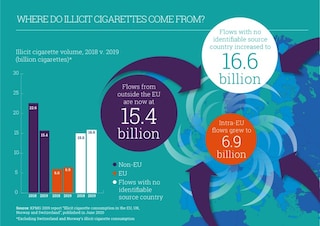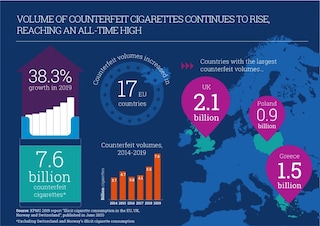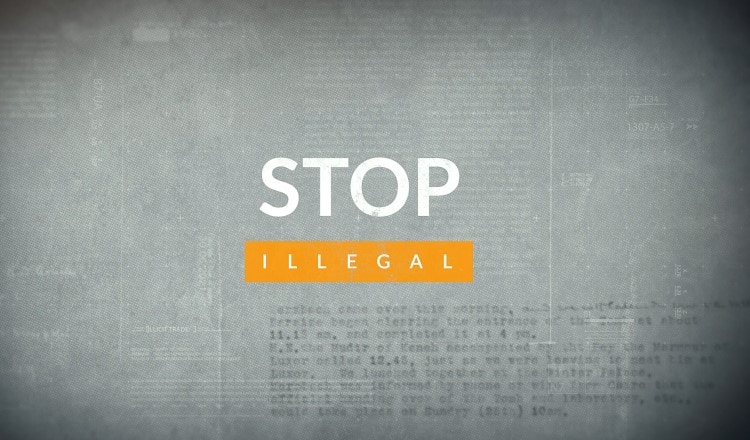
New KPMG report: Illicit cigarettes in decline across Europe despite growth in illicit manufacturing within the EU
19 jun 2020

The consumption of illicit cigarettes is falling across Europe in 2019 despite an increase in illicit manufacturing operations within EU borders. This is according to KPMG’s latest annual study, which has analyzed the scale and development of the illicit cigarette market across all EU member states, U.K., Norway, and Switzerland. The report shows that 4.7 billion fewer illicit cigarettes were consumed in the EU last year compared to 2018 — a total of 38.9 billion illicit cigarettes, which represents 7.9 percent of total cigarette consumption.
Much of the decline was driven by a steady decrease of illicit cigarettes coming into the EU from traditional source countries like the Ukraine and Belarus. This fall highlights the significant progress made by law enforcement and customs agencies collaborating across the public and private sector to stamp out the issue.
However, while considerable efforts have taken place to stem contraband cigarettes from flowing into the EU, we are once again seeing criminal organizations shifting their operations to stay one step ahead of anti-illicit programs.
A growing problem from within

Over the past four years, significant progress has been made to bring down the overall level of illicit cigarettes coming from non-EU countries, especially from the Ukraine, Belarus, Algeria, and Moldova. However, illicit cigarettes originating from within EU borders and moving between European countries continue to increase in comparison to previous years.
Reports from law enforcement agencies reveal an increase in the number of raids on illicit cigarette factories in 2019. This points to a consistent rise in the number of illegal factories opening up within the EU borders. According to the KPMG report, these factories were a key driver in the increase of illicit white and counterfeit cigarette consumption within the EU. And for the first time since the research began in 2006, counterfeit cigarettes and illicit whites represented more than 50 percent of total illicit cigarette consumption, with counterfeit cigarettes now at the highest level ever recorded by KPMG, reaching 7.6 billion counterfeit cigarettes.
This shift highlights the challenge facing law enforcement officials trying to stamp out illicit trade. Confronted with increased security and tighter border controls, criminal organizations simply moved their operations into Europe.
Further intelligence suggests that organized crime groups are building multiple factories to mitigate the risk of police raids fully shutting down their operations. Officials are also noticing that the machinery seized during raids is becoming
increasingly high tech and operations are more professional, with manufacturers producing illicit cigarettes at scale for organizations and smugglers who can transport and distribute large volumes. This has encouraged the formation of new criminal
groups that specialize in smuggling raw and fine-cut tobacco, and non-tobacco materials such as filters, papers and packaging, operating separately from traditional illicit manufactured cigarette makers and smugglers.

Working together, key to staying ahead of the curve
KPMG’s findings highlight the rapidly changing nature of the illicit cigarette landscape in Europe. Cooperation between the EU’s many law enforcement agents, customs officials, governments, and private companies has had a significant positive impact in reducing illicit cigarette consumption within the EU. However, as criminal organizations adapt as a result of these efforts, it is more important than ever that those aiming to tackle illicit trade are able to respond dynamically to the intra-EU challenges ahead of them.
The continued decline of illicit cigarette consumption in the EU in 2019 is a positive development; however, there is no doubt that the issue is not going anywhere fast, with the same persistent problems occurring and new trends constantly emerging. Effective collaboration is key to staying ahead of the curve—whether that be the advancement and implementation of regulations such as FCTC Protocol to Eliminate Illicit Trade in Tobacco Products, the tracking and tracing provisions under the EU Tobacco Products Directive, or expanding knowledge sharing and training efforts between the public and private sector. It is critical that the EU’s law enforcement agents and officials continue to develop coordinated responses, taking a collaborative approach in combating the manufacturing, transportation, and consumption of illicit cigarettes.
Read the full KPMG report on the illicit trade of cigarettes in Europe.
Related articles
Share this link
Illicit trade prevention


